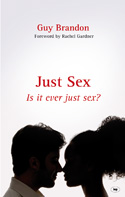Just Sex – Is It Ever Just Sex?
Guy Brandon (2009), IVP, Nottingham224 pages; £9.99. ISBN: 978-1-84474-371-1

This book opens with four pages of glowing commendations by a dozen evangelical worthies. Is it really that good? Dare I appraise it? Yes, of course!
The author is a researcher at the Jubilee Centre in Cambridge, famous for its past campaigns, including Keep Sunday Special, handling debt and relational order. And, although the book is primarily about sex, it this latter topic that becomes the book’s encompassing theme, as both the mirror and the antidote to our culture’s current enthusiasm for destructive sex.
All of us can (and do) bemoan society’s sexual chaos – free condoms for children, widespread cohabitation and adultery, devaluation of marriage, excessive media fascination, and so on. Guy Brandon rightly diagnoses these as just symptoms, while confirming the ‘me-culture’ as the real disease. Such an analysis should constrain us to seek the genuine cure.
And that cure, according to Brandon, is found in relational order. He begins, ‘Christianity is, strikingly, a relational religion.’ This grand theme is then fleshed out, via the Golden Rule of Matthew 22 and ‘shalom’, to embrace all of our relationships, be they, with God, family, neighbour, business, justice, health, education or finance. And of course, sex.
In terms of sex, Brandon is clear. Sex is a gift from God, but it is neither consequence-free nor responsibility-free. Furthermore, consent alone between two adults is never a sufficient basis for justifying sexual intercourse. Such sub-standard behaviour, whether among those married or not, whether occurring in private or public domains, has a rippling effect that is corrosive to a whole pool of current and future relationships. By contrast, relational order fosters wholesome personal development and social stability. This is the Christian response to our sad, sex-obsessed world. And Brandon is in no doubt that this biblical concept could/should be incorporated into public policy.
There are some quibbles – the writing is not always clear, sometimes repetitive and the book needs an index to assist subsequent referral. In addition, some readers will baulk at the seemingly-soft approach to homosexual and cohabiting relationships, sex before marriage, the idea that family is more important than marriage and the disapproval of children who seek employment away from the parental home.
But beware, this book will jolt some of your prejudices and challenge you to reconsider how you relate to people in our fallen world, in both sexual and non-sexual contexts. For that, thank you, Guy.
| Top p |